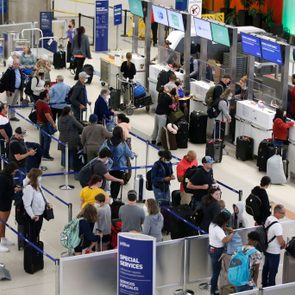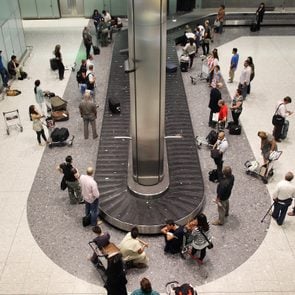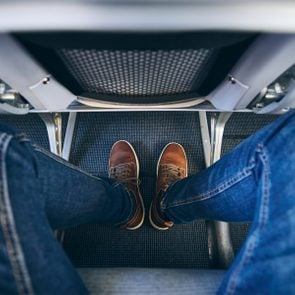The Most (and Least) Delayed Airlines in the U.S.
Updated: Apr. 17, 2024
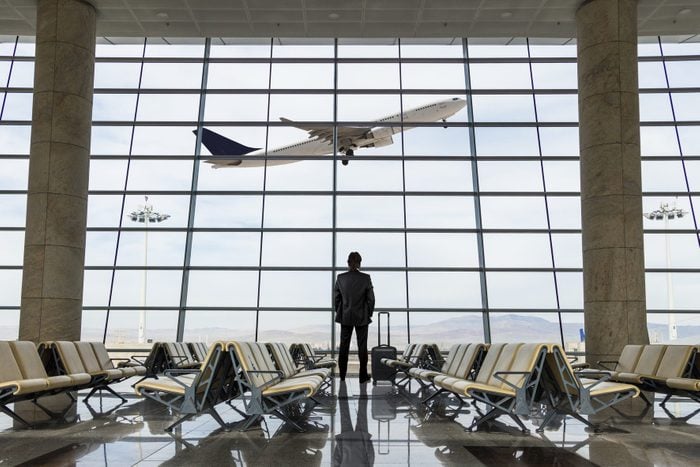
A delayed or canceled flight can ruin your travel plans. Here are the best and worst airlines for delays, according to a recent study.
Nothing throws a wrench in your vacation or business travel plans quite like a delayed or canceled flight. Not only are you stuck at the airport for longer than you planned, but the delay can also kick off a chain reaction of schedule screw-ups. It could be a minor inconvenience, like less time on the beach or a missed lunch at a restaurant you were looking forward to sampling. Or maybe it’s a major disruptor such as a missed flight connection or your cruise ship departing without you because you quite literally missed the boat—all because you flew on one of the most delayed airlines.
With 2023 on the record books as the busiest year ever for air travel, there’s little reason to think that things will slow down in 2024. And that means fliers will continue to deal with delays and cancellations. But a new report from Tradingpedia on the best and worst airlines for flight delays and cancellations may help you choose a carrier when it’s time to buy plane tickets. Let’s take a look at the study methodology and, most importantly, the results!
Get Reader’s Digest’s Read Up newsletter for more travel, humor, cleaning, tech and fun facts all week long.
About the experts
|
How were the airlines ranked?
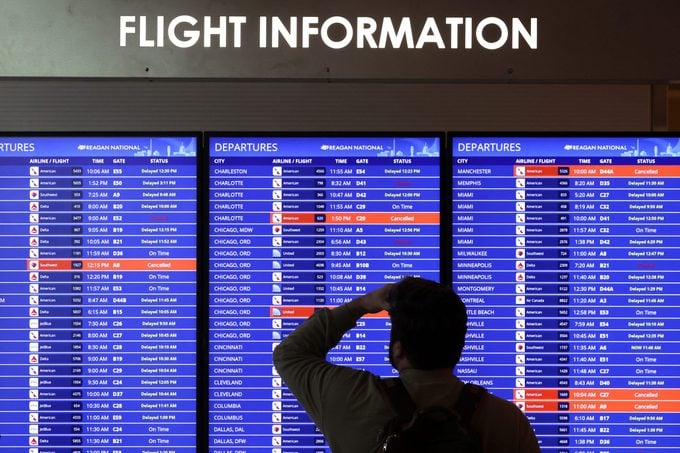
The best-and-worst-airline report was written by Michael Fisher, a market analyst with Tradingpedia, who shares the following information about the methodology with Reader’s Digest. “The team at Tradingpedia compiled monthly on-time performance data for U.S. airlines and airports from OAG [a private travel data provider] and the Federal Aviation Administration,” he says. The study looked at only the 13 airlines running 20,000 flights or more per year within the United States. “We meticulously calculated the delay and cancellation rates for each airline … throughout the 12 months of 2023, which allowed us to rank them from most to least punctual.” Fisher explains that for airlines (the report also studied delays and cancellations per airport), the term “delay” refers to flights arriving 15 minutes or more after their scheduled times.
What is the most delayed airline?
The highly dubious honor of most delayed airline goes to Silver Airways. With just 15 planes in its fleet, the largest of which holds 70 passengers, this regional carrier operates from hubs in South Florida and San Juan, Puerto Rico. It flew just over 25,000 flights in 2023—more than 35% of which were delayed, though fewer than 1% were canceled altogether.
The low-cost carrier is a no-frills airline that gets you where you need to go around Florida and the Caribbean (most of the time, at least) but does little else—there’s no food or beverage service on its flights. But low prices aren’t enough to endear it to the flying public: User reviews on airline-rating site SkyTrax give it 2 out of 10 points.
What is the most punctual airline?
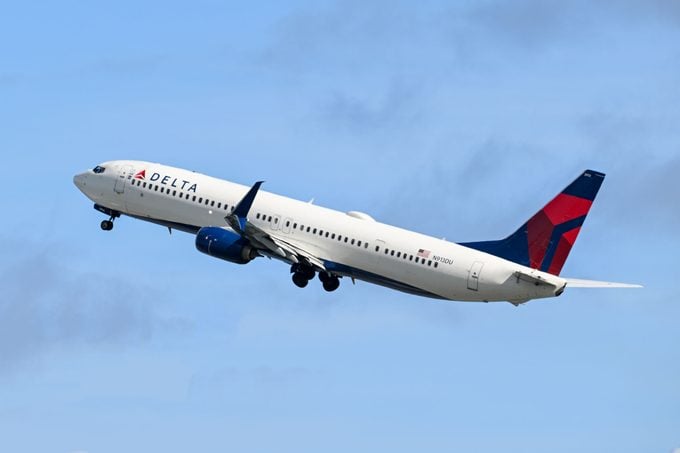
The most on-time airline in the U.S. is a familiar one: Delta. The industry giant flew more than 1.6 million flights in 2023, and fewer than 16% were delayed and only 1.21% were canceled. There are nearly 1,000 planes in Delta’s fleet, and the carrier runs more than 5,400 flights daily, both within the U.S. and internationally. Bigger doesn’t necessarily mean that much better, though: SkyTrax users give the airline 4 out of 10 as an overall customer rating.
Most and least delayed airlines: The full list
Here are the Tradingpedia results for the top five most and least delayed airlines. Airlines were ranked by their cumulative percentage of delays and cancellations.
Fewest delays and canceled flights
| Airline | Delayed Flights | Canceled Flights |
| Delta | 15.62% | 1.20% |
| Alaska | 18.21% | 0.68% |
| American | 19.85% | 1.10% |
| United Airlines | 19.66% | 1.73% |
| Southwest Airlines | 23.58% | 0.96% |
Most delays and canceled flights
| Airline | Delayed Flights | Canceled Flights |
| Silver Airways | 36.56% | 0.73% |
| Frontier Airlines | 30.94% | 1.75% |
| JetBlue Airways | 30.03% | 1.88% |
| Cape Air | 22.58% | 7.98% |
| Spirit Airlines | 28.95% | 1.59% |
Behind the rankings
According to the report, more than 69% of flight delays are caused by weather, so we can’t blame the airlines for that one. Anton Radchenko, co-founder of Air Advisor, an air passenger claims management company, says that smaller aircraft will be more affected by bad weather conditions. For example, take a look at Cape Air’s high cancellation rate compared to other airlines. The carrier runs a fleet of 97 planes, but they each hold just nine passengers. So yes, says Radchenko, “Cape Air’s delays are more weather-related because of their planes’ smaller size. Turbulence is typically worse in small planes compared to large planes because they weigh less, so they’re more susceptible to wind changes and, hence, more turbulence.”
The report also suggests that when it comes to on-time performance and cancellations, you might get what you pay for. With the exception of Cape Air, all the airlines on the “worst” list are low-cost carriers. Radchenko suggests that flight delays and disruptions may be a result of the low-cost business model. “They have a tendency to spend less money on things that can improve punctuality, like training, hiring better-quality staff and securing more aircraft that can be used when one plane experiences a bird strike or other situations that warrant mechanical fixes for safety.” (But keep in mind that low-cost doesn’t always equate to a bad customer experience: Low-cost carriers Southwest and JetBlue, along with Delta, top a 2023 list for customer satisfaction among airlines.)
But Radchenko also says that it might not entirely be the low-cost carriers’ fault. “Budget carriers are delayed because they’re not given as much preference as top-tier airlines,” he says. “For example, if there’s a weather-induced delay that affects both a budget and full-service carrier going from point A to point B, the latter will fly first when the weather clears up. That’s because passengers have paid more to fly a full-service airline compared to a budget airline. This preference based on the price of services is directly baked into the airline industry, though it’s not explicitly stated. So it’s pretty natural that a Delta flight will be less delayed compared to a JetBlue flight, even when they have the same cause of delay.”
Tips for avoiding a flight delay
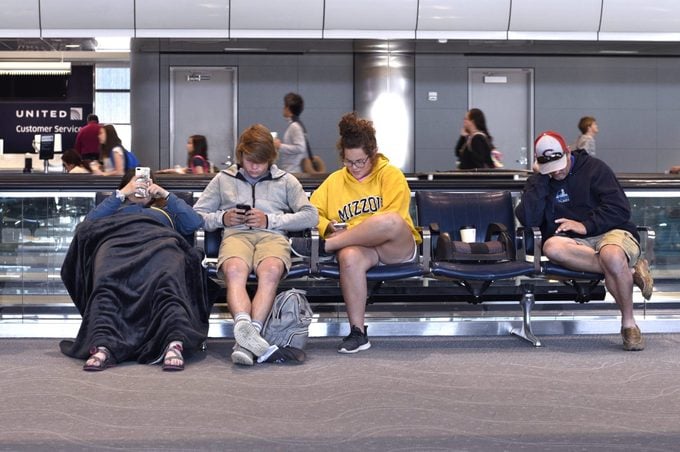
Regardless of which airline you fly, follow these tips for on-time flying:
- Book an early morning flight. Research has shown morning is the best time to day to fly for avoiding delays.
- Fly from an airline’s hub whenever possible. Airlines have more flights arriving and departing from their hubs, so you have a better chance of getting on an alternate flight than you would at a smaller airport. Plus, they typically have more flight crew based in their hubs, so finding a backup crew member is easier if a pilot or flight attendant unexpectedly can’t make their scheduled flight.
- Fly from one of the top-rated airports for on-time flights. After all, it’s not only the airline that may be responsible for a delay; it could be an issue with the airport’s ground traffic controllers or ground crew.
Why trust us
At Reader’s Digest, we’re committed to producing high-quality content by writers with expertise and experience in their field in consultation with relevant, qualified experts. We rely on reputable primary sources, including government and professional organizations and academic institutions, as well as our writers’ personal experiences where appropriate. We verify all facts and data, back them with credible sourcing and revisit them over time to ensure they remain accurate and up to date. Read more about our team, our contributors and our editorial policies.
Sources:
- Michael Fisher, market analyst with Tradingpedia; email interview, April 2024
- Anton Radchenko, co-founder of Air Advisor; email interview, April 2024
- Tradingpedia.com: “The best and worst airports and airlines in the U.S. based on flight delays and cancellations”
- Skytrax: “Airline Reviews”
